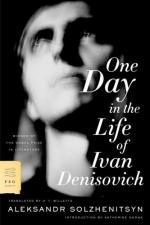|
|
One Day in the Life of Ivan Denisovich Section 2 (pg. 22-40)
Tiurin, the respected squad leader of the 104th, calls the men out for roll call. Tiurin has been imprisoned for nineteen years and knows all the ins and outs of the Soviet camp system. It seems he has been able to bribe the officials out of reassignment. All the squad leaders use salt pork to "grease the hands" of the P.P.D. (Production Planning Department).
At roll call, there are twenty-four men from the 104th, including the squad leader, Tiurin. The only one missing is Panteleyev, the squealer of the group, who works in a soft, cushy office job. Ivan Denisovich, after getting the number on his jacket touched up by a camp artist, comes across a fellow squad member, Tsezar Markovich, smoking a cigarette. Although Ivan Denisovich longs for a smoke, he is subtler about his desire than Fetiukov, the jackal, who bluntly begs Tsezar for a puff:
"Every nerve in his body was taut, all his longing was concentrated in that cigarette butt--which meant more to him now, it seemed, than freedom itself--but he would never lower himself like that Fetiukov, he would never look at a man's mouth." pg. 24-25
Tsezar, annoyed at Fetiukov for disturbing his thoughts, gives the butt of his cigarette to Ivan Denisovich. Just then, there is word that the guards are checking for something. At the command of Lieutenant Volkvoi, the hated security chief, the guards search the prisoners for any extra clothing. Tsezar is written up for wearing a vest as is Buinovsky, a former naval captain, who protests, "You're not behaving like Soviet people; you're not behaving like communists." (p. 28) Lieutenant Volkvoi does not take kindly to Buinovsky's comments and he gives the Captain ten days in the guardhouse. The Lieutenant is hated for good reason; he is known to have carried a whip around. After being carefully counted, the prisoners march to their work sites. The chief of the escort guards recites the morning prayer, the rules and regulations of marching. The prisoners trod along, lost in their thoughts.
Ivan Denisovich's thoughts lie in his hometown of Temnenovo, where he learns from his wife's letters that the men of the village are abandoning the kolkhoz, or collective farms. They have all but given up on the traditional work of farming and carpentry; instead many have taken up a profitable new craft--carpet painting. Ivan Denisovich is perplexed that the men of his village would abandon their honorable work for this new craft, no matter how profitable. He feels that even if given his freedom, he would prefer to work with his two capable hands.
Meanwhile, just before entering the gatehouse, the prisoners line up in columns. While waiting to go through, Ivan Denisovich observes two people, quite different from one another. One is Alyosha the Baptist, who seems content and quite oblivious to the misery of the cold and the long day of work ahead:
"Alyosha, who was standing next to Shukov, gazed at the sun and looked happy, a smile on his lips. What had he to be happy about? His cheeks were sunken, he lived strictly on his rations, he earned nothing. He spent all his Sundays muttering with the other Baptists. They shed hardships of camp life like water off a duck's back." pg. 36
The other person is Tiurin, who looks morose and hardened. Tiurin is a "true son of the GULAG," the name for the Soviet camp system. He knows the system thoroughly, and thus works to ensure the best for his squad. Ivan Denisovich has known Tiurin since their days in Ust-Izhma and in transferring camps, Tiurin personally chose Ivan Denisovich for his squad. "In camp the squad leader is everything: a good one will give you a second life; a bad one will put you in a coffin." pg. 36
While the authorities and squad leaders plan for the day's work assignments, the prisoners have some free time. Ivan Denisovich eats the half ration of bread he brought with him. As he chews, he remembers how he used to eat in his village--so much food that he never fully appreciated. Ivan Denisovich has learned in camp how to take full advantage of every little thing, even eating. He remembers how back home in the farms he would stuff himself with food. In the camp, his hunger is rarely satisfied, but even with so little food he has done much work.
The two Estonians are sitting next to Ivan Denisovich. They look alike and share everything together. They had, in fact, met in camp, but they are like brothers. Tiurin never separates them. Ivan Denisovich observes their quiet, deliberate manner and concludes that of all the Estonians he has known, he has never met a bad one.




